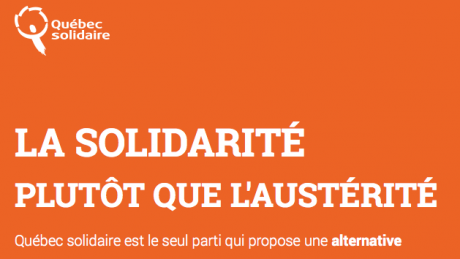News
You are here
Québec solidaire local economy tour

May 13, 2016
Quebec’s anti-austerity party, Québec solidaire, has launched a series of tours of Quebec’s regions to consult with local communities outside of the two big municipalities of Montreal and Quebec City.
Québec solidaire (QS) grew out of those two urban centres, and is now trying to build a deeper base in Quebec’s many regions outside them. The party has launched the regional tour at a time when Montreal and Quebec City are on the verge of receiving special status from Couillard’s Liberal austerity government.
QS is also trying to develop a meaningful economic platform for the 2018 Quebec election, based on what will speak to people across regional differences who are concerned about jobs and the environment. It is based on a vision of job creation that is both environmentally sustainable and economically just, in part through development of local economies.
This vision ultimately involves nationalization of energy industries like wind and solar, and the creation of jobs in sustainable large-scale industry. But it is also about looking at what is going on at the smaller scale. The tour aims to consult with local organizations and small business at a time when Couillard’s government is dismantling local structures of decision-making, the Centres of local development (CLDs) and Corporations of economic and community development (CDECs).
Quebec solidaire’s vision for sustainable economic renewal includes reversing the cuts to public services like health and education, which provide not only services but jobs—one-third of jobs in the Gatineau region, for example. But it also includes encouraging local production and local consumption to challenge both the carbon footprint and multinational control of the economy, as well as the unhealthy practices of big agribusiness.
Regional tour in Gatineau
Manon Massé, QS elected member of the National Assembly responsible for women’s issues and the environment, and delegate to the COP21 conference in Paris, led the tour of the Gatineau region on May 4-6. She was accompanied by Andres Fontecilla, co-spokesperson of Quebec solidaire.
Featured on the tour were cooperatives like the Laiterie de l’Outaouais, an organic dairy coop unique in North America, local bakery Boulangerie Aux Deux Frères, and local growers and agricultural producers. Manon Massé travelled to the rural village of Ripon which holds a weekly farmers’ market and held a meet and greet at the « Solidarity Cooperative » at the Place du Marché.
The tour hosted public events such as a panel on local consumption at the Marché de solidarité de l’Outaouais (“solidarity market”), a panel at the local CEGEP (college) on “Climate Change: what the Paris accord represents for Quebec and the Outaouais,” and a meet and greet in downtown Hull. There were private meetings and focus groups with women’s organizations, an immigrant women’s association, and with people working in local arts and culture.
Manon and Andres held a media conference in Hull about why QS is holding these tours. They talked about the promise and potential QS sees in regions such as Gatineau, for sustainable growth and for an economy based on solidarity and justice. Coming out of the last election QS as a party made a commitment to prioritize including the regions in its vision for a Quebec free of austerity and neoliberalism. Building an economic platform through consultation takes time, which is why the tour is happening now in anticipation of 2018.
Fight for $15
Although separate from the local economy tour, at the very same time as its launch Quebec solidaire also launched its public support for the fight for a $15 minimum wage.
As the first step in an ad campaign to tell the public that the concerns of real, ordinary people are the concerns of Quebec solidaire, the party released a series of posters with photos of ordinary Quebecois that read “I think the minimum wage isn’t enough… We think the same.” These posters will appear across Quebec, in all regions.
Both this campaign and the local economy tours are a way for QS to share its belief more widely in the real possibility of an economy driven by the priorities of the 99%, not the 1% of Quebec’s business elite like recently-resigned PQ leader Pierre-Karl Pelladeau and Liberal leader Couillard.
It is Quebec capital and multinationals that destroy both decent jobs and the climate. But it is local communities, progressive social movements and ordinary people that Québec solidaire wants to put into power.
Section:










